| Srl | Item |
| 1 |
ID:
163142
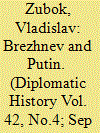

|
|
|
|
|
| Summary/Abstract |
Vladimir Putin's announcement to run for another term makes him the most durable leader in Russia's recent history. Some think of Putin as "the new Brezhnev," who might die in office many years from now. But is it fair to compare Putin to Leonid Brezhnev? Can the Soviet past provide any lesson's for Russia's present and future? What should the United States expect for Putin?
|
|
|
|
|
|
|
|
|
|
|
|
|
|
|
|
| 2 |
ID:
163141
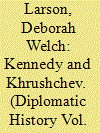

|
|
|
|
|
| Summary/Abstract |
Despite his cold war rhetoric, John F Kennedy wanted to improve US Soviet realtions after he took office in January 1961. In his inaugral address, Kennedy suggested that they "begin anew the quest for peace". After only a month, Kennedy invited Nikita S Khrushchev to an informal summit meeting, believing that the Soviet leader would appreciate this gesture of respect.
|
|
|
|
|
|
|
|
|
|
|
|
|
|
|
|
| 3 |
ID:
163140


|
|
|
|
|
| Summary/Abstract |
What are the risks to global security when a disrupter rises to lead a nuclear armed superpower? Imagine a leader who publicly vows "to smach in the teeth"; or who issues an off-hand nuclear threat to a foreign adversary while talking to a group of school teachers, saying "we have rockets which can land precisely at a preset traget 13,000 kilometers away.
|
|
|
|
|
|
|
|
|
|
|
|
|
|
|
|
| 4 |
ID:
162787
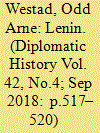

|
|
|
|
|
| Summary/Abstract |
Lenin was a Marxist revolutionary who saw himself, and his organization, the Bolsheviks, as the vanguard of the global working class. His view of the world was based on what he saw as the unavoidable confrontation of opposing forces in world politics, socialism vs. capitalism. In his policies he was relentlessely internationalist, even though he was quite capable of temporary compromise on behalf of the Soviet state which was based within the former Russian empire.
|
|
|
|
|
|
|
|
|
|
|
|
|
|
|
|
| 5 |
ID:
163143
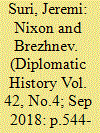

|
|
|
|
|
| Summary/Abstract |
Although besieged by public anger over a volatile economy and failed foreign wars, a rise in terrorism, and impeachment proceedings in Congress, President Richard Nixon visited the US Naval Academy in June 1974 and extolled detente with the Soviet Union. He defended his policies od cooperation with an aggressive Russian adversary.
|
|
|
|
|
|
|
|
|
|
|
|
|
|
|
|
| 6 |
ID:
163144
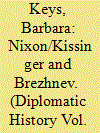

|
|
|
|
|
| Summary/Abstract |
In June 1973, Leonid Brezhnev arrived in Washington for his second summit meeting with President Richard Nixon. Knowing of the Soviet leader's fondness for luxury automobiles, Nixon gave him a shiny Lincoln Continental. Brezhnav was delighted with the present and insisted on taking a spin around Camp David, speeding through turns while the president nervously asked him to slow down.
|
|
|
|
|
|
|
|
|
|
|
|
|
|
|
|
| 7 |
ID:
162775
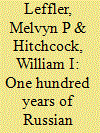

|
|
|
|
|
| Summary/Abstract |
In the spring of 2017 many members of SHAFR participated in an exchange of emails and expressed frustration, indeed exasperation, over the prevailing state of affairs in the United States and elsewhere around the globe. Scholars voiced their dismay at the disregard for truth, facts, and objective analysis, as well as the scorn for expertise, among our leaders and in our public discourse. SHAFR members asked one another how they could make a difference. They wondered whether they could transcend the gulf that was dividing the American public. What could historians do to bridge the gap and assist policymakers?
|
|
|
|
|
|
|
|
|
|
|
|
|
|
|
|
| 8 |
ID:
163139
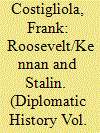

|
|
|
|
|
| Summary/Abstract |
It has been easy for Americans to grow angry, exasperated, or disgusted with the Russians, regardless of whether Lenin, Stalin, Khrushchev, Brezhnev, or Putin Was in charge. Think of all the appaling outrages, from the Katyn forest massacre and the mass rapes by Red Army soldiers during World War II, to the repression of Eastern Europe in the cold war, to the more recent aggression against Georgia and Ukraine. Not to mention the Berlin and Cuban crises of a half century ago and the egregious interference in the US election last year. Even during the Grand alliances, the Russians aggravated American sensibilities with their secretiveness and suspicion.
|
|
|
|
|
|
|
|
|
|
|
|
|
|
|
|
| 9 |
ID:
163138


|
|
|
|
|
| Summary/Abstract |
"The combination of Russian revolutionary sweep with American efficiency is the essence of Leninism," declared Joseph Stalin in 1924, the year of Lenin's death. Stalin's fascination with American culture and business ethnic was shared by many Bolsheviks of the 1920s.
|
|
|
|
|
|
|
|
|
|
|
|
|
|
|
|
| 10 |
ID:
163131


|
|
|
|
|
| Summary/Abstract |
The ideological clash between US President Woodrow Wilson and the Russian Bolshevik leader Vladimir Lenin, which began when the Bolsheviks took power in Russia in late 1917, was a defining moment in the international history of the twentieth century. Throughout his time in power, how-ever, Wilson viewed the Bolshevik threat as merely one part of the global crisis of his era, a crisis that encompassed not only the ongoing world war but also a set of longer term historical forces shaping developments both at home and abroad. So in order to understand Wilson's response to Lenin and the lessons it has for our time, we must first consider the historical context of that relationship.
|
|
|
|
|
|
|
|
|
|
|
|
|
|
|
|